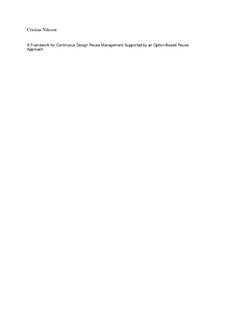| dc.contributor.author | Nilsson, Cristian | nb_NO |
| dc.date.accessioned | 2014-12-19T12:25:59Z | |
| dc.date.available | 2014-12-19T12:25:59Z | |
| dc.date.created | 2007-10-02 | nb_NO |
| dc.date.issued | 2007 | nb_NO |
| dc.identifier | 122756 | nb_NO |
| dc.identifier.isbn | 978-82-471-3067-4 | nb_NO |
| dc.identifier.uri | http://hdl.handle.net/11250/241295 | |
| dc.description.abstract | This PhD thesis aims to address the problem of missed design reuse opportunities across consecutive products in industry. The research specifically targets the perceived knowledge gap regarding conceptual tools for reuse-related decision-making under different levels of uncertainty about the future. The research progressed according to the following method: first, we performed qualitative interviews in industry to identify and delimit the above chosen area of improvement potential. Second, we did an extensive analysis of literature, studying the dynamics of design reuse from six viewpoints: the process –, market –, costs –, artefact –, knowledge –, and organisational views. Also, two of the most important product development strategy trends (platform-based and lean product development) were investigated from the perspective of design reuse. Third, we did synthesis of conceptual tools, using abductive reasoning and combining elements from different knowledge fields, to provide our main contributions as presented below. Fourth, we evaluated the results by discussing their internal consistency and relevance to the research community and to industry.
The first of the main results is the continuous reuse management framework, which highlights how reuse-related decisions at micro-level (individual design solutions) translate to a macrolevel flow of design solutions across product generations, driving the evolution of the product portfolio. The continuous reuse management framework is intended as a conceptual decisionsupport tool encouraging pragmatic, proactive, and uncertainty-aware handling of reuse. We classify the micro-level reuse approaches into three types, according to 1) whether preparation for reuse takes place and 2) whether future reuse is predetermined. These types are: ad-hoc reuse (no preparation for reuse), option-based reuse (preparation for future option to reuse) and predetermined reuse. The option-based reuse approach is the second main result of this PhD study. It can be described as a novel formalisation of the way companies reason when they invest in the reusability of a solution to provide future projects the option to reuse it. The option-based reuse approach borrows real-options thinking from financial theory to value future reusability of design solutions. | nb_NO |
| dc.language | eng | nb_NO |
| dc.publisher | Fakultet for ingeniørvitenskap og teknologi | nb_NO |
| dc.relation.ispartofseries | Doktoravhandlinger ved NTNU, 1503-8181; 2007:139 | nb_NO |
| dc.title | A Framework for Continuous Design Reuse Management Supported by an Option-Based Reuse Approach | nb_NO |
| dc.type | Doctoral thesis | nb_NO |
| dc.contributor.department | Norges teknisk-naturvitenskapelige universitet, Fakultet for ingeniørvitenskap og teknologi, Institutt for produktutvikling og materialer | nb_NO |
| dc.description.degree | PhD i produktutvikling og materialer | nb_NO |
| dc.description.degree | PhD in Engineering Design and Materials | en_GB |
